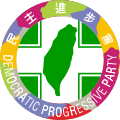| No. | Portrait | Name | Term of office | Mandate | Party session | Notes |
|---|
| 1 | 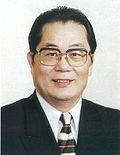 | Chiang Peng-chien | 28 November 1986 | 20 December 1987 | 1986
(unopposed) | 1st | |
|---|
| 2 |  | Yao Chia-wen | 20 December 1987 | 30 October 1988 | 1987 | 2nd | |
|---|
| 3 |  | Huang Hsin-chieh | 30 October 1988 | 20 January 1992 | 1988 | 3rd | |
|---|
| 1990 | 4th |
| 4 | 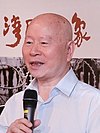 | Hsu Hsin-liang | 20 January 1992 | 4 December 1993
(Resigned) | 1992 | 5th | Resigned after 1993 local elections defeat |
|---|
| — |  | Shih Ming-teh | 4 December 1993 | 18 July 1994 | Vice-chair as acting Chair | |
|---|
| 5 | 18 July 1994 | 23 March 1996
(Resigned) | 1994 | 6th | Resigned after 1996 presidential election defeat |
|---|
| — |  | Chang Chun-hung | 23 March 1996 | 18 July 1996 | Vice-chair as acting Chair | |
|---|
| (4) | 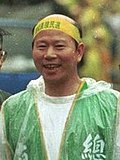 | Hsu Hsin-liang | 18 July 1996 | 18 July 1998 | 1996 | 7th | |
|---|
| 6 | | Lin Yi-hsiung | 18 July 1998 | 20 April 2000 | 1998
Lin Yi-hsiung – 58,560 
(unopposed) | 8th | |
|---|
| 7 | 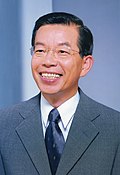 | Frank Hsieh
Chang-ting | 20 April 2000 | 21 July 2002 | 2000
Frank Hsieh – 53,510 
(unopposed) | 9th | |
|---|
| 8 | 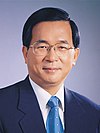 | Chen Shui-bian | 21 July 2002 | 11 December 2004
(Resigned) | President as Party Chair | 10th | Resigned after 2004 legislative election defeat |
|---|
| 11th |
| — |  | Ker Chien-ming | 11 December 2004 | 15 January 2005 | Vice-chair as acting Chair | |
|---|
| 9 | 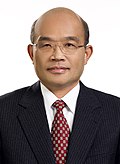 | Su Tseng-chang | 15 January 2005 | 3 December 2005
(Resigned) | 2005
Su Tseng-chang – 68,406 
(unopposed) | Resigned after 2005 local elections defeat |
|---|
| — | 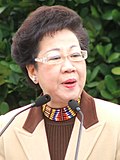 | Annette Lü
Hsiu-lien
(Interim) | 3 December 2005 | 15 January 2006 | Vice-chair as acting Chair | |
|---|
| 10 |  | Yu Shyi-kun
(Resigned) | 15 January 2006 | 21 September 2007 | 2006 | 12th | Resigned amid corruption charges |
|---|
| — |  | Chai Trong-rong | 21 September 2007 | 15 October 2007 | Vice-chair as acting Chair | |
|---|
| (8) |  | Chen Shui-bian | 15 October 2007 | 12 January 2008
(Resigned) | President as Party Chair | Resigned after 2008 legislative election defeat |
|---|
| — |  | Frank Hsieh
Chang-ting | 12 January 2008 | 20 May 2008 | Vice-chair as acting Chair | |
|---|
| 11 |  | Tsai Ing-wen | 20 May 2008 | 17 March 2011
(Temporary leave) | 2008 | 13th | Temporary leave of chairwomanship to focus on 2011 presidential party primary. |
|---|
2010
Tsai Ing-wen – 78,192 
You Ching – 8,406 | 14th |
| — |  | Ker Chien-ming
(Interim) | 17 March 2011 | 27 April 2011 | Vice-chair as acting Chair | |
|---|
| (11) |  | Tsai Ing-wen | 27 April 2011 | 29 February 2012
(Resigned) | Resumes chair | Resigned after 2012 presidential and legislative elections defeat |
|---|
| — |  | Chen Chu | 29 February 2012 | 30 May 2012 | Vice-chair as acting Chair | |
|---|
| (9) |  | Su Tseng-chang | 30 May 2012 | 28 May 2014 | 2012
Su Tseng-chang – 55,894 
Su Huan-chih – 23,281
Wu Rong-i – 16,315
Chai Trong-rong – 12,497
Hsu Hsin-liang – 2,763 | 15th | |
|---|
| (11) |  | Tsai Ing-wen | 28 May 2014 | 24 November 2018
(Resigned) | 2014
Tsai Ing-wen – 85,410 
Kuo Tai-ling – 5,734 | 16th | Resigned after 2018 local elections defeat |
|---|
| President as Party Chair | 17th |
| 18th |
| — |  | Lin Yu-chang | 28 November 2018 | 9 January 2019 | Nominated by Central Committee | |
|---|
| 12 |  | Cho Jung-tai | 9 January 2019 | 20 May 2020 | 2019
Cho Jung-tai – 24,699 
Michael You Ying-lung – 9,323 | |
|---|
| (11) |  | Tsai Ing-wen | 20 May 2020 | 26 November 2022
(Resigned) | President as Party Chair | 19th | Resigned after 2022 local elections defeat |
|---|
| 20th | |
| — |  | Chen Chi-mai | 30 November 2022 | 18 January 2023 | Nominated by Central Committee | |
|---|
| 13 | 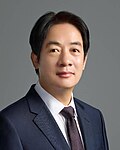 | William Lai
Ching-te | 18 January 2023 | Incumbent | 2023 |
|---|
